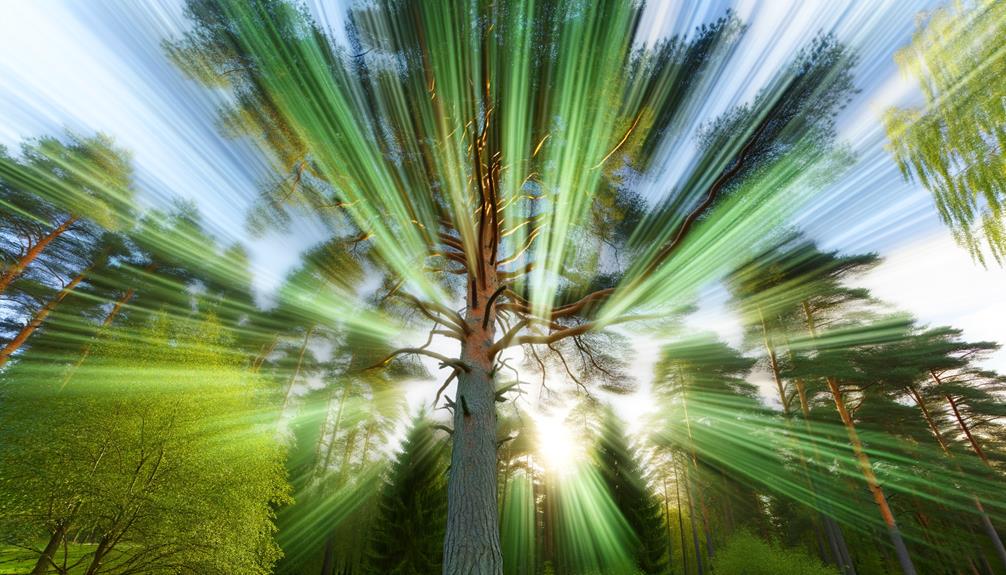Meaning of Pine Tree in the Bible: Endurance, Immortality
In the Bible, the pine tree symbolizes endurance, divine provision, and eternal life. It is particularly mentioned in Isaiah 41:19 as a witness to God’s transformative power and provision in barren places.
Historically, pine trees were significant during the Feast of Tabernacles as recorded in Nehemiah 8:15, embodying resilience and steadfast faith. The evergreen nature of the pine reflects God’s perpetual love and faithfulness, as seen in Isaiah 60:13 where it represents joy and prosperity.
The pine tree invites believers to trust in God’s unwavering support, making it a rich symbol of spiritual resilience and divine promise. Explore further theological and historical contexts to gain deeper insights.

Biblical Meaning of the Pine Tree: Eternal Life, Strength, and Spiritual Restoration
| Symbolism | Meaning | Explanation |
|---|---|---|
| Everlasting Life and Immortality | Represents eternal life and immortality through faith in God. | Pine trees, being evergreen, symbolize eternal life and endurance, reflecting the promise of everlasting life through God’s grace (Isaiah 60:13). |
| Strength and Resilience | Symbolizes strength, endurance, and resilience in faith. | The sturdy nature of the pine tree reflects the strength and resilience of those who remain rooted in their faith, enduring through life’s trials. |
| Restoration and Growth | Signifies restoration, healing, and spiritual growth. | Pine trees are mentioned in Isaiah 41:19 as part of God’s promise to restore the land and bring forth growth, symbolizing spiritual renewal and healing. |
| Beauty and Majesty | Represents beauty and divine majesty. | The tall and majestic pine tree is symbolic of God’s creation and the beauty of His works, as noted in Isaiah 60:13, where the pine is mentioned as part of God’s glorified kingdom. |
| Provision and Protection | Symbolizes God’s provision and protection. | Pine trees, often used for shelter and resources, can be seen as a symbol of God’s provision for His people, offering protection and sustenance through nature. |
Pine Tree in Biblical Scripture

The pine tree, though not frequently mentioned, appears in several key scriptural passages where it symbolizes endurance, prosperity, and divine provision.
In Isaiah 41:19, the Lord promises to plant pine trees in the wilderness as a sign of His transformative power and blessing.
Historically, pine trees were valued for their sturdy wood and resin, essential for construction and daily life in ancient Israel.
In Nehemiah 8:15, pine branches were used during the Feast of Tabernacles, symbolizing God’s provision and protection.
Theologically, these references underscore God’s ability to provide and sustain His people in both physical and spiritual deserts.
Hence, the pine tree in biblical scripture is a profound metaphor for divine faithfulness and care.
Symbol of Endurance

In biblical literature, pine trees are emblematic of endurance, reflecting both the steadfastness of God’s promises and the resilience required of His followers. Historically, the pine’s ability to thrive in harsh conditions symbolizes unwavering faith. Isaiah 41:19 describes God planting pine trees in the desert, signifying His power to sustain life amid adversity. This notion of endurance is further illustrated through the evergreen nature of pine trees, which remain verdant through all seasons, mirroring the perpetual faithfulness of believers.
| Scriptural Reference | Symbolism | Emotional Impact |
|---|---|---|
| Isaiah 41:19 | God’s Sustenance | Comfort in Adversity |
| Psalm 92:12 | Righteous Flourishing | Hope and Assurance |
| Numbers 24:6 | Divine Provision | Gratitude and Trust |
| Isaiah 55:13 | Everlasting Legacy | Inspiration and Joy |
This enduring symbol invites believers to trust in God’s steadfastness.
Spiritual Resilience

Cultivating spiritual resilience, pine trees in biblical texts exemplify the strength and fortitude that believers are called to embody in their faith journey.
Scripture often alludes to trees as metaphors for steadfastness and deep-rooted faith. Isaiah 41:19 mentions the pine tree as part of God’s promise to provide for His people, symbolizing enduring support in times of adversity.
Historically, pine trees were esteemed for their ability to withstand harsh climates, reminiscent of the spiritual resilience required to navigate life’s trials.
Theological insights draw parallels between the unyielding nature of the pine and the unwavering faith expected of believers, encouraging them to remain steadfast and deeply rooted in their convictions, regardless of external challenges.
Evergreen Significance

Evergreen in nature, pine trees in biblical symbolism represent eternal life, unwavering faith, and the perpetual presence of God. These trees, through their enduring foliage, evoke the constancy of divine love and the steadfastness of spiritual truths. Historically, the ancient Hebrews saw evergreen trees as a reflection of God’s unending covenant with His people. Isaiah 60:13 mentions the pine tree as a symbol of joy and prosperity blessed by the Lord. This perennial symbolism resonates deeply, offering a visual representation to God’s enduring grace.
| Symbolism | Scriptural Reference |
|---|---|
| Eternal Life | Isaiah 60:13 |
| Unwavering Faith | Psalms 1:3 |
| Perpetual Presence | Ezekiel 17:24 |
| Divine Covenant | Genesis 9:12-13 |
Such imagery fosters a profound connection to the divine and theological insights.
Metaphor for Eternal Life

Frequently, the metaphor of the pine tree in the Bible serves as a poignant symbol of eternal life, illustrating the unending nature of existence granted by God’s grace.
In theological terms, the evergreen foliage of the pine tree signifies perpetuity and resilience, reflecting God’s promise of eternal life.
Historically, ancient cultures, including those surrounding Israel, revered evergreen trees as symbols of immortality.
Scriptural references, such as Isaiah 60:13, underscore this symbolism: ‘The glory of Lebanon shall come unto thee, the fir tree, the pine tree, and the box together, to beautify the place of my sanctuary.’
This verse portrays the pine tree as part of a divine vision of everlasting splendor, reinforcing its role as a metaphor for the eternal life bestowed upon the faithful.
Divine Promise of Renewal

Building upon the metaphor of eternal life, the pine tree in the Bible also encapsulates the divine promise of renewal, symbolizing the rejuvenation and restoration that emanates from God’s covenant with His people.
This symbolism is deeply rooted in theological insight, historical context, and scriptural references.
Consider the following:
- Isaiah 41:19: ‘I will plant in the wilderness the cedar, the acacia, the myrtle, and the olive; I will set in the desert the cypress, the plane, and the pine together.’
- Ezekiel 17:24: ‘All the trees of the field shall know that I am the LORD.’
- Historical Context: Pine trees thrived in ancient Israel, representing enduring life and God’s ongoing care.
Thus, the pine tree embodies God’s assurance of perpetual renewal.
Conclusion
In biblical scripture, the pine tree serves as a symbol of spiritual resilience and endurance.
Its evergreen nature signifies eternal life and divine promise.
Scriptural references highlight its role as a metaphor for perpetual renewal and steadfast faith.
Through theological insight and historical context, the pine tree encapsulates the essence of enduring strength, unyielding faith, and everlasting hope, reinforcing the timeless truths embedded in biblical teachings. The pine tree’s significance as a symbol of endurance and strength dates back to ancient civilizations, where it was revered for its ability to withstand harsh conditions and provide shelter and sustenance. In the context of Christianity, the pine tree also serves as a reminder of the enduring faith and hope found in the teachings of Jesus Christ. When viewed through the lens of rowan tree symbolism, the pine tree takes on added layers of meaning, representing protection, healing, and the power to overcome adversity.
This alliterative articulation accentuates the tree’s theological significance.






